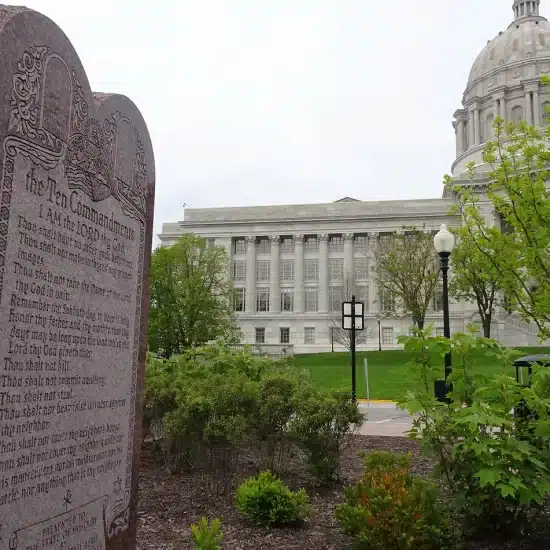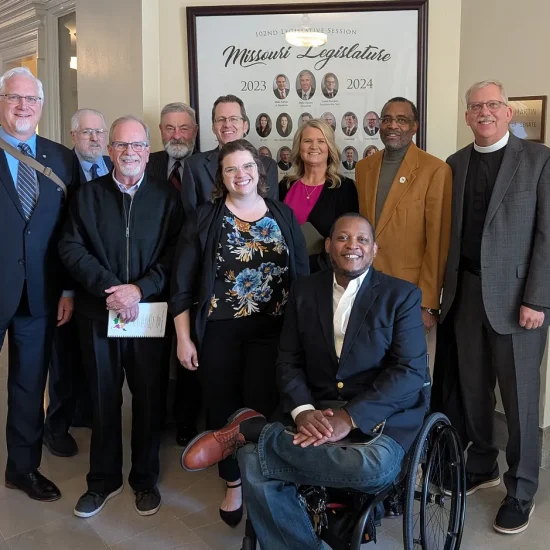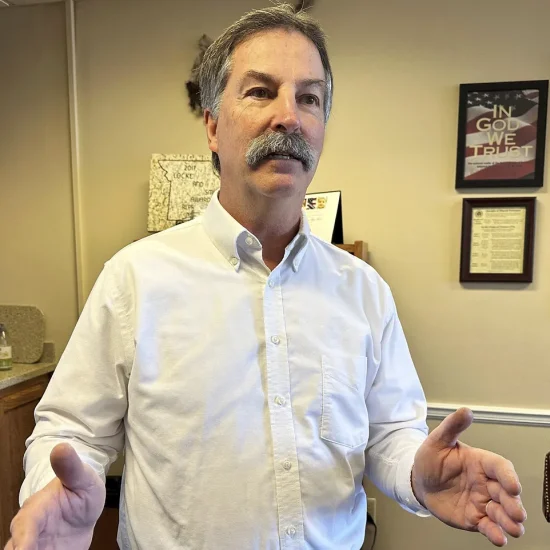The economic crisis in the U.S. has had an effect on Baptist institutions in Missouri, including lesser levels of donor income. But they are weathering challenging times to maintain ongoing ministries, according to their leaders.
 |
Most depend upon fund-raising for a portion of their support and closely watch the performance of endowment funds and other investments.
Word&Way asked Baptist institutions how they have been affected by the recession. The following includes those who responded to the e-mail questionnaire:
The Baptist Home
“The Baptist Home has noticed a slight reduction in donations from churches and individuals due to the downturn in the economy,” said president Steve Jones. “A few donors have notified us that they plan a reduction in their giving.”
“The Baptist Home has a long-range strategy with its endowment investments and only takes a small percentage for its use year after year,” he said.
“In times when the market does well, the extra is reinvested in order to hedge inflation and build endowment,” Jones explained. “In years of less gain, the home can count on the same level of income to provide cash flow for expenses. As you know, health care costs continue to escalate and it is a challenge for the home to meet these expenses.”
The Baptist Home invests its endowment in a balance fund with a mixture of stocks, bonds and cash instruments, he said. “Although the home has lost some of its gains on investments, its principal to-date has not suffered loss. The administrative team continues to keep a tight reign on expenses while at the same time monitoring quality of care for residents.
“The home has not reduced staff or staffing costs due to the economy,” he said.
“The home is sensitive to donor fatigue; however, it continues to share the need for support since the home does not receive government funding,” Jones said. “The development team is working to strengthen relationships with churches and individuals. The team is researching and developing strategies to diversify and increase its donor base in the areas of corporate gifting, foundation grants and estate planning.
“The home continues to provide nearly $2 million of benevolent care to its residents provided by its endowment and ongoing donations. All ongoing donations are applied directly to resident care costs.”
Missouri Baptist Children’s Home
“Cash gifts are down but deferred gifts and real estate gifts are up,” said Robert Springate, vice president for public relations at the children’s home.
“Planned giving is not suffering but income from endowments is down,” he added. “Our income fluctuations are moderated by using a four-year average in taking income from investments.”
During times of general economic stress, “we need to be intentional about telling our story since the needs of those we serve can deepen in a recession,” Springate said.
Windermere Baptist Conference Center
“The general economic conditions have resulted in some group and individual cancellations for the season and off-season,” Windermere president and CEO Dan Bench acknowledged. “We are working hard at filling any vacancies with new and different people and groups.
“Our response to this has been to reduce the size of the summer staff as well as reduce the number of part-time employees we would normally have hired for the season,” he said. “We will continue to make needed adjustments based on the actual number of guests and the revenues available.
“We have not found it necessary to reduce the permanent staff this year but we have reduced it by more than 30 percent over the past four years, so we were already operating with what I consider to be the minimum staff needed to operate the campus,” he said.
“God has continued to bless this ministry and we will do what we need to do in order to keep it operating,” Bench said.
Missouri Baptist University
“Thus far the impact has been minimal as far as our finances go, said Missouri Baptist University president Alton Lacey. “Our enrollment is at the highest level ever and increased by 8 percent over the previous spring.
“We expect that we will see increases in some of our costs, such as health insurance, which increased 25 percent last year, and perhaps other vendor costs will rise,” he said.
“We do see an increased demand for financial aid and some students’ families have been victimized by layoffs,” he added. “We will be in the market for construction financing and we expect that it will be more complex and cumbersome even though we have a strong financial statement.
“I also anticipate that some companies and school districts will cut back on funding for graduate education, which may impact us. There is also a negative impact from government as state legislators look for ways to fund the operating budgets of public institutions. One such plan calls for taking away funding from scholarships for independent college students.”
“Our endowment has suffered losses like every other institution,” Lacey indicated. “However, endowment income makes up less than 1 percent of our revenue, so it has very little effect.
“We have had a few people make smaller pledges than they normally would have but overall our giving has held its ground,” he said.
MBU has been cautious in its approach to budgeting, projecting future enrollment conservatively, limiting new hires and keeping operating expense budgets as flat as possible.
The university has tried to manage costs to students, limiting tuition increases to 5 percent, raising the amount of available scholarships, and keeping room and board at the same level as last year.
“If a family has experienced a loss of income during the year, we are committed to working with that family to adjust financial aid to the highest levels for which they are eligible,” Lacey said.
Hannibal-LaGrange College
Woodrow “Woodie” Burt, president of Hannibal-LaGrange College, said the school is certainly not immune to current economic realities. “As a result, the college has re-evaluated ways we can better serve our students, their parents and our employees,” he said.
“Because our endowments are so diversified and the fact that we have invested conservatively over recent years, HLG has experienced a smaller decrease in our endowment holdings than expected,” Burt explained. “Actually, we have begun to see an increase in our earnings in recent days.
“We continue to make contacts with friends of the college to let them know of our needs,” he said. “Though some of our friends are not able to help us to the extent they have in the past, most of them have continued to support our efforts.
“We've been blessed by our wonderful donors, friends and alumni who have been faithful to support us throughout this challenging time,” he said. “We have actually seen an increase in giving from some of those alumni and other friends who had not previously supported the college.”
HLG has cut its budget in certain areas, such as supplies and equipment, he said.
“We are making the campus more ‘green’ as we renovate existing facilities, and build new buildings,” Burt said. A pair of new 48-bed dormitories are currently under construction and should be ready for occupancy by August.
“As staff and faculty openings occur, we carefully examine each position for possible joint alignment with other existing positions,” he said. In addition, we take a hard look at the necessity of filling the vacated position in order to effectively meet the needs of the institution.”
In addition, “The college has stepped up its student recruitment efforts, and the number of applications for next fall is at an all-time high.”
William Jewell College
“Though our enrollment expectations for new students for the fall look good, we are seeing much more uncertainty among families as they think about beginning their student’s college education,” William Jewell College president David Sallee said. “They are being more cautious, waiting longer, checking out all the financial questions before making firm decisions.
“The value of our endowment has declined with the stock market,” he acknowledged. “We count on endowment for a portion of our operating budget, so this is a concern for us and does have an impact on our operating budget.
In the area of development, “Giving is down some, but not a huge amount at this point,” Sallee said.
Like other institutions, Jewell has made reductions to its expense budget for the current fiscal year and for next year. “We continue to monitor expenses very closely,” he said.
Southwest Baptist University
C. Pat Taylor, president of Southwest Baptist University, said the school has noticed reduced contributions and that it is more difficult to secure long-term commitments. SBU has postponed a planned campaign until the economy improves.
“Annual contributions would be less if we had not received a $1 million gift,” he added. “A positive side of the recession for SBU is the apparent price consciousness of parents and prospective students, and our costs compare very favorably to other private and Christian schools.”
SBU’s endowment investments have lost approximately 35 percent. “Since we have had additions to the endowment, it is down only approximately 25% percent,” Taylor said.
“We continue to stay in touch with our alumni, friends and donors, and we continue to focus on planned giving,” he added. “Our development efforts are more focused on specific goals and maintaining relationships because of the economy.
“We are more strategic in our thinking and planning future budgets than in the past,” Taylor said. “We are cautiously optimistic and have exercised more caution than normal in filling vacancies and new positions.”
Baptist General Convention of Missouri
“We have heard from a few pastors who have indicated that the economy is impacting their members and congregations,” said Baptist General Convention of Missouri executive director Jim Hill. “However, we have also heard from those who indicated their support has not changed.
“Our convention revenue is down some this year, which I am sure reflects the impact of the economy is having in their communities and congregations,” he said.
“Difficult economic times do provide some significant opportunities for churches,” Hill said. “Obviously, the churches have the opportunity to assist those who are struggling.”
“This assistance may include financial assistance for food, utilities and other necessities, but it may be in counseling, assistance identifying public sources of assistance, prayer and spiritual support,” Hill said.
“I also believe difficult economic times allow churches as well as denominational organizations and other non-profits to re-evaluate their priorities and improve efficiencies,” he said.
“No one likes difficult times, but sometimes they allow us to grow and become more focused on our real priorities.”
Word&Way
Word&Way has suffered shortfalls in donor gifts and subscription income this year, but it is moving toward improving its development program.
The organization has cut back on staff travel and is exploring other means of cost-cutting, including temporary reduction in the staff benefits line item.
At the same time, Word&Way has moved ahead aggressively to update its services, including the launch of a new Web site (www.wordandway.org).
Bill Webb is editor of Word&Way.






